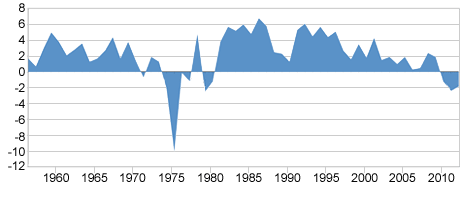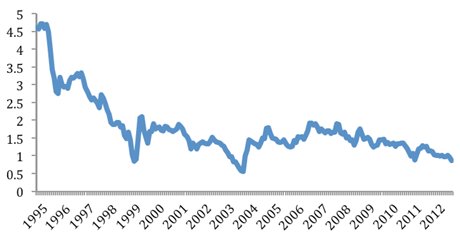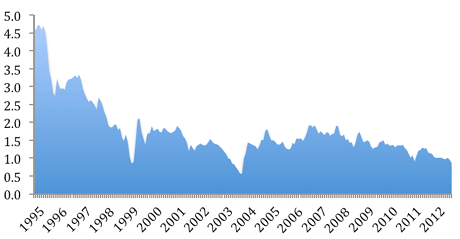What’s the bond market telling us?
With yields on UK gilts and US Treasuries at record lows, are government bonds in a bubble? Or is the market warning us to expect years of Japan-style deflation and stagnation? Phil Oakley investigates.
Get the latest financial news, insights and expert analysis from our award-winning MoneyWeek team, to help you understand what really matters when it comes to your finances.
You are now subscribed
Your newsletter sign-up was successful
Want to add more newsletters?

Twice daily
MoneyWeek
Get the latest financial news, insights and expert analysis from our award-winning MoneyWeek team, to help you understand what really matters when it comes to your finances.

Four times a week
Look After My Bills
Sign up to our free money-saving newsletter, filled with the latest news and expert advice to help you find the best tips and deals for managing your bills. Start saving today!
Most small investors spend the majority of their time looking at stock markets. However, I've always believed that to get a deeper understanding of what's really going on, the best thing you can do is to try to figure out what the bond market is telling you.
Why? Because the yields on government bonds have a major impact on the price of virtually all investment assets. Put simply, rising yields tend to reduce the value of assets, while lower ones tends to make them go up.
That's because government bonds are supposed to be the safe' assets. That's very debatable, but assuming the market believes this, then if the yields on government bonds go up, then the yields on other assets such as shares or property should go up too in order to remain attractive. These higher yields are usually achieved because prices fall.
MoneyWeek
Subscribe to MoneyWeek today and get your first six magazine issues absolutely FREE

Sign up to Money Morning
Don't miss the latest investment and personal finances news, market analysis, plus money-saving tips with our free twice-daily newsletter
Don't miss the latest investment and personal finances news, market analysis, plus money-saving tips with our free twice-daily newsletter
The current action in the bond market is probably the biggest conundrum facing investors today. Despite the massive debts held by governments, yields on the likes of UK gilts and US Treasuries are at record lows.
Is the bond market one massive bubble like dotcom stocks in 1999 or property in 2006, or is it telling us that we face years of Japan-style deflation and stagnation?
The bond bubble': irrational exuberance or plain realism?
Have a look at the chart below. It shows the redemption yield on ten-year UK government bonds, less the rate of inflation, since 1956 the real yield. This chart is used by the bond bubble camp to claim that government bonds are massively overvalued and ready for a crash.
UK real ten-year bond yields

They argue that no rational investor should accept bond yields less than the rate of inflation. Investing should be about preserving and growing the purchasing power of your money, therefore buying bonds in the current market doesn't make sense.
I've got a lot of sympathy with this view of the bond market. With ten-year UK gilts at 1.55%, there's little to lose in holding cash.
However, I can also understand why big companies might want to deposit large amounts of cash in the bond market rather than a bank. The £85,000 deposit insurance limit might cover most small investors' needs, but it doesn't help companies with significant cash holdings.
The bubble camp also points out that the UK and US bond markets have been heavily manipulated and propped up by the money-printing and bond-buying of their respective central banks. This has in effect, resulted in a one-way bet for investors.
With heavy central bank buying of bonds pushing up prices and pushing down yields, there's been some easy money to be made in the bond market. This can't go on forever, argue the bond bears.
Again, I have a lot of sympathy with this view. But let's ask ourselves for a moment: what if the bond market is right? What if the UK, US and European economies are actually going the same way as Japan?
If that's the case, and we're facing low economic growth and falling prices (deflation), then bond yields could go even lower. Is this the outcome that Western bond markets are correctly anticipating?
Are the UK and the US turning Japanese?
The arguments made by the bond market bears are very sensible, but I'm not in a hurry to dismiss the bond market. Compared to the equity market, it's often seen as the smart money. It's always worth at least considering the possibility that it's priced correctly.
So could we be heading for a deflationary bust despite the best efforts of the Federal Reserve and the Bank of England?
Let's have a look at what has happened in the Japanese bond market.
Japanese ten-year bond yields (%)

As you can see, in 1995, more than five years after the Japanese stock market peaked and the economy started to cool, Japanese government bonds (JGBs) were still yielding 4.5%. Seventeen years later, yields on JGBs are now sitting at 0.77% as repeated attempts to stimulate the economy and increase inflation have failed.
This is because Japan is still stuck in what is known as a 'balance sheet recession' - a recession caused by too much debt. The focus of consumers and companies has been to get rid of debt, rather than spend more money. Printing money and cutting interest rates doesn't do any good in this scenario, because there is no desire to spend, just to save and pay off debt.
Most of the Western world is currently in a similar situation. It too has way too much debt and unfunded welfare liabilities. The credit boom of the mid-2000s means that debt has to be repaid and/or bankruptcies need to rise. Governments and central banks have been doing everything they can to prevent the market from doing its job and a natural correction happening just as occurred in Japan.
This debt overhang means that despite the large amounts of money printing, the UK and US economies are still stagnating. Money printing is barely keeping the huge deflationary forces at bay.
So could bond yields fall further? Respected economists such as Gary Shilling think so. Shilling has a fantastic record in predicting major economic events and is a prominent deflationist have a read of his book The Age of Deleveraging. Earlier this year, in a television interview he discussed the possibility of the yields on 30-year US bonds hitting 2% (they are currently 2.58%).
How is this possible? Well, looking back at Japan again, you can see that even with yields of less than 1% you can still have positive real yields (in other words, you can still make a real' return) if you have deflation. If this is the fate that awaits the UK and US then rather than being hysterical and heavily manipulated, the bond markets are ahead of the game.
Japanese real yields (%)

What happens next: deflation then inflation?
So there are good grounds to argue that the bond market may be right in predicting that deflation is the major threat in the short-term.
As I argued in my recent article on money-printing, the forces of deflation are so great that the central banks will have to print lots more money than most people expect to create inflation and erode the massive debt burden we face. Only then will the bond market bubble pop and stock and property markets will crash.
The other alternative is for governments to get out of the way and let the markets correct. But for politicians this would be akin to turkeys voting for Christmas.
In Greece, Ireland, Portugal and now Spain, the bond market free of central bank money printing has done its job and punished reckless economic behaviour. In the UK and US, the central banks have so far postponed the day of reckoning, but that day will surely come. And when it does, they seem to be voting for an inflationary rather than a deflationary bust.
So what can you do with your money?
It's not easy to predict when the bond market will collapse as central bankers get their way and spark inflation. The good news is that you don't have to.
While government bonds could remain at low yields and could go lower we still wouldn't own them. There's little upside and lots of downside. If you are worried about deflation, then as an individual, holding cash is a safer bet. It also gives optionality to take advantage of falling prices (in other words, if you're sitting on cash, you can quickly deploy it when you spot bargains).
Hold some gold too as a hedge for when inflation rears its ugly head, as politicians try to print us out of trouble. Foreign currency investments could also preserve your purchasing power if massive money printing destroys the value of the pound.
Finally, any equity investments should be in companies that have pricing power and so are able to cope with both inflation and deflation. Tobacco stocks and utilities could be good options here. (For more on promising equity income options, see my guide to building an income portfolio).
Get the latest financial news, insights and expert analysis from our award-winning MoneyWeek team, to help you understand what really matters when it comes to your finances.
Phil spent 13 years as an investment analyst for both stockbroking and fund management companies.
-
 Average UK house price reaches £300,000 for first time, Halifax says
Average UK house price reaches £300,000 for first time, Halifax saysWhile the average house price has topped £300k, regional disparities still remain, Halifax finds.
-
 Barings Emerging Europe trust bounces back from Russia woes
Barings Emerging Europe trust bounces back from Russia woesBarings Emerging Europe trust has added the Middle East and Africa to its mandate, delivering a strong recovery, says Max King